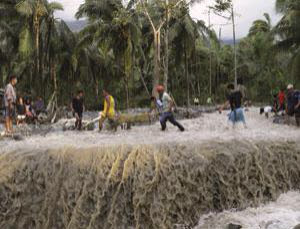 |
| Who Pays |
The talks ended with yet another agreement to agree, but many are calling this small victory a significant step forward. The deal offers a distant promise of climate aid. But first, science will have to catch up with politics.
All countries will suffer as a result of climate change, even if humanity slashes its emissions and stops temperatures rising more than 2 °C above pre-industrial levels - the stated goal of the UN negotiations. At current rates, a 3 or 4 °C rise is likely this century.
As a consequence, deserts will spread and lethal heatwaves will become more frequent. Changes in rainfall will bring droughts, floods and storms, andrising seas will swamp low-lying areas, obliterating valuable territory.
So far, climate negotiations have taken a two-pronged approach to the problem. On the one hand, they have sought to create incentives or imperatives to cut emissions. On the other, they have established funds to help poor nations pay for "adaptation" measures, such as sea walls and irrigation systems, to help fend off the unavoidable consequences.
That, according to some, leaves a third element missing. Some consequences cannot easily be kept at bay. Countries will suffer food shortages and more frequent and more severe storm surges. On 28 November, the charities ActionAid, CARE International and WWF released a report arguing that rich countries should compensate poor ones for such damages. Doing so is a moral obligation and must be part of any treaty on climate change, says Niklas Höhne of renewable energy consultancy Ecofys in Utrecht, the Netherlands.
In Doha, a coalition including China, the Alliance of Small Island States and the G77 group of developing countries proposed a scheme that would decide when countries had suffered climate damages, and compensate them for their loss. The idea gained momentum after typhoon Bopha struck the Philippines last week. That country's negotiator Naderev Saño broke down in tears during a speech. "As we sit here, every single hour, even as we vacillate and procrastinate here, we are suffering."
Developed nations balked at the prospect of being held accountable for the consequences of emissions. Early versions of the text included the word "compensation" but they objected that it implied blame. In the end, they agreed to create "arrangements [...] to address loss and damage associated with the impacts of climate change".
The deal poses a fundamental challenge to climate science, because it is difficult to work out whether trends and events are caused by greenhouse gases or would have happened anyway. "We can't say that an individual event was caused by climate change," says Nigel Arnell of the University of Reading, UK. "What we can do is say that the chance of it happening was greater."
Computer models can be made to replicate the decades preceding a natural disaster with and without humanity's impact. If the odds turn out to be different with and without greenhouse gas emissions, it suggests that emissions were at least partially to blame. In this way, studies led by Myles Allen at the University of Oxford have shown that the 2003 European heatwave and 2011 Texas drought were both made more likely by human emissions.
The costs of such extreme events is relatively straightforward to calculate. But "attribution" science is in its infancy. Kevin Trenberth of the National Center for Atmospheric Research in Boulder, Colorado, speculates that superstorm Sandy would not have flooded the New York subways
On the other hand, we can link slow processes like rising global temperatures or sea level rise to emissions. For this reason, many people think we should focus first on compensating people harmed by these processes - Pacific islands whose shorelines are gradually disappearing underwater for instance - and worry about extreme weather events once the science has caught up. The trouble is, unlike the damage caused by a hurricane, it is difficult to work out how much these slow processes cost. According to Arnell, the problem may prove unworkable. More